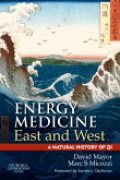
Energy medicine east and west: the natural history of Qi
Mayor, David F.
Micozzi, Marc S.
Energy Medicine East and West: A Natural History of Qi provides a unique, comprehensive overview of Qi or bioenergy for students and practitioners of energy medicines, Chinese and Oriental Medicine, and all disciplines of Complementary and Integrative Medicine. Mayor and Micozzi start with a comparative historical account of the ancient concepts of Qi and vital energy before covering theories of Qi, a discussion of the organized therapeutic modalities based upon Qi and its applications to specific health and medical conditions. Contributions are included from international experts in the field. The book moves from anatomical and bioenergetic complementarity of Western vital energy and EasternQi, through convergence of perspectives and models to demonstrations of how the traditional therapies are being melded together in a new, original and creative synthesis. David Mayor and Marc Micozzi are experienced medical practitioners, authors and editors. David Mayor has been actively involved in bioenergyresearch, practice and publishing for over 30 years, and is author/editor of Electroacupuncture: A practical manual and resource (2007), as well as other acupuncture texts and studies. Marc Micozzi is Professor in the Department of Physiology and Biophysics at Georgetown University School of Medicine, Washington, DC. As author/editor of Fundamentals of Complementary & Alternative Medicine, 4E (2011), and 25 other books, he has been writing, editing and teaching on bioenergy, Qi and related topics for 20 years. Endorsements INDICE: Foreword Preface Acknowledgements Contributors Abbreviations SECTION 1 THE ETHNOMEDICINE OF ENERGY - A GLOBAL VIEW 1. Qi in Asian medicine 2. Flows and blockages in Rwandan ritual and notions of the body 3. Elemental soulsand vernacular qi: some attributes of what moves us SECTION 2 QI IN CHINESE MEDICINE 4. The anatomical foundations of qi 5. Qi in Chinas traditional medicine: the example of tuina 6. Qi cultivation in qigong and taiji quan 7. Qigong theory and research SECTION 3 THEORY AND EXPERIMENT IN QI RESEARCH 8. The language of qi, quantum physics and the superimplicate body 9. Qi and the frequencies of bioelectricity 10. Systems theory: trapping and mapping healing with qi11. The physiology of qi SECTION 4 QI AND ENERGY MODALITIES IN CONTEMPORARY PRACTICE 12. Energy and medicine 13. What does it mean to practice an energy medicine? 13.1 Experiencing qi 13.2 Thinking about qi and acupuncture 14. Evidencing energy: experiences in acupuncture and therapeutic bodywork (Zero Balancing) 15. Eight modalities for working with qi: chakra acupuncture, with qigong,meditation and the five sources of energy 16. Ki in shiatsu 17. Bioelectrity and qi: a microcurrent approach 18. Energy psychology: working with mind-body synergy 19. Craniosacral biodynamics SECTION 5 CLINICAL APPLICATIONS OF QI ANDENERGY-BASED MODALITIES 20. Qi in children 21. Qigong, taiji quan (tai chi) and HIV: the psychoneuroimmunology connection 22. Energy-based therapies in neurology: the example of Therapeutic Touch 23. Qi in chronic fatigue and fibromyalgia 24. The electrical heart: energy in cardiac health and disease SECTION 6CONCLUSION 25. Themes of qi and a dozen definitions: content analysis and discussion Glossary: a vocabulary of qi References Index
- ISBN: 978-0-7020-3571-5
- Editorial: Churchill Livingstone
- Encuadernacion: Rústica
- Páginas: 420
- Fecha Publicación: 01/06/2011
- Nº Volúmenes: 1
- Idioma: Inglés
